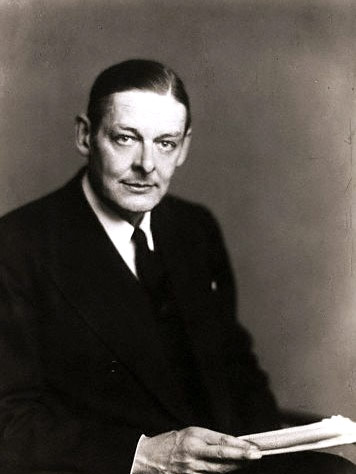T. S. Eliot (1888-1965) is so hard to read that every class session on his poetry might just as well start with the question, “Why bother reading something so difficult?” I think you have to start by admitting that poetry this difficult actually might not be worth reading. Writing incomprehensible poetry is actually pretty easy. “Easier to write than to read” is practically a definition of one kind of pretentious poetry. Since life is so short and books so plentiful, hard poetry had better do something to earn your precious attention.
Eliot earns attention by scattering luminous fragments of instant clarity across the surface of every one of his poems. Wherever you look you find some collocation of words that makes you say “aha” or “ooh.” “Where the wind blows the water white and black,” “I have measured out my life with coffee spoons,” “such a vision of the street as the street hardly understands,” and so on. They’re not much to cling to when you’re drowning in a sea of obscurity, but they’re something, and they’re freely available even to casual readers. Sometimes it’s just the right adjective paired surprisingly with the right noun that makes you think, “Now that’s the way to say that!”
After all, one of the things we want poetry to do for us is to name an experience which hasn’t yet been named, or which has been laboring under a false name. We learn names easily enough for a certain range of experiences –chiefly the useful experiences that we want to be able to repeat on command– but for the rest of our lives we wander around encountering all sorts of phenomena which we can’t describe. When it’s time to name something so subtle it’s escaped our powers of description, we call in the poets. Eliot talked about a struggle “which alone constitutes life for a poet –to transmute his personal and private agonies into something rich and strange, something universal and impersonal.” (Selected Essays p. 117)
Most of us have things we want to get done and people we want to communicate with, so we narrow our range of concerns, and agree to name and describe things within the acceptable range. Can’t quite put a word to that sense of nostalgia for a place you’ve never been? Not sure how to describe what’s wrong the world when your eyes are a bit unfocused after too much reading? A bit overwhelmed with the surge of emotion brought on by a song you don’t even like? Call in the poets: they’re especially skilled at naming the just barely nameable.
Think of the world as divided between things easily labelled and things just barely describable. Civilians work with the easily labelled things, but when something just barely describable confronts us, we call in the language marines: poets. But then, out beyond that, there’s Eliot and the type of poetry he represents. It’s another step beyond. It agrees that special tactics need to be applied to the nearly-unspeakable. Eliot argued that, given the way the twentieth century was turning out, “it appears likely that poets in our civilization, as it appears at present, must be difficult.” Why? Because in a complex world, “the poet must become more and more comprehensive, more allusive, more indirect, in order to force, to dislocate if necessary, language into his meaning.” Eliot knows he’s asking words to do things they’re not trained to do, and that the odds are against him:
And so each venture
Is a wholly new beginning, a raid on the inarticulate
With shabby equipment always deteriorating
In the general mess of imprecision of feeling,
Undisciplined squads of emotion
(from East Coker)
All of this is fairly normal behavior for the abnormal craftsmen we call poets. Where Eliot takes the next step is with his insistence that the things he wants to say and describe and name and evoke are not things out on the edges of our experience which we can ignore if we choose to. Eliot is convinced that it is a matter of life or death for persons and cultures that we learn to name those things.
What if something awful is rolling toward your generation and nobody knows what to call it? What if part of our desperate situation is our inability to name ourselves and our situation? What if we can’t appropriate the goodness available to us unless we can recognize it as what it is and tell ourselves and each other about it? What if the source of our life is a mystery that can’t be definitively spoken but must be acknowledged, praised, confessed? What if the region of the ineffable isn’t out at the boundaries of our lives but right at the center?
If that’s the case, we’re going to need special training in poetics. Eliot’s a few leagues ahead of us on this project, and has developed techniqes and strategies that must be seen to be believed. He also, of course, has a take on the nature of those permanent things that can just barely be said, and once he gets the project underway he’s likely to undercut the assumptions I’ve just set up. But if the easily-accessible bits of word-smithing draw you in enough to dig deeper, or if you think any of the above “what if”s might be right, or if you just like to watch things get hauled in out of the zone of the ineffable, then take a shot at T. S. Eliot. From Prufrock to Four Quartets, he’s up to something worthwhile, and the benefits of reading him do eventually repay the effort.